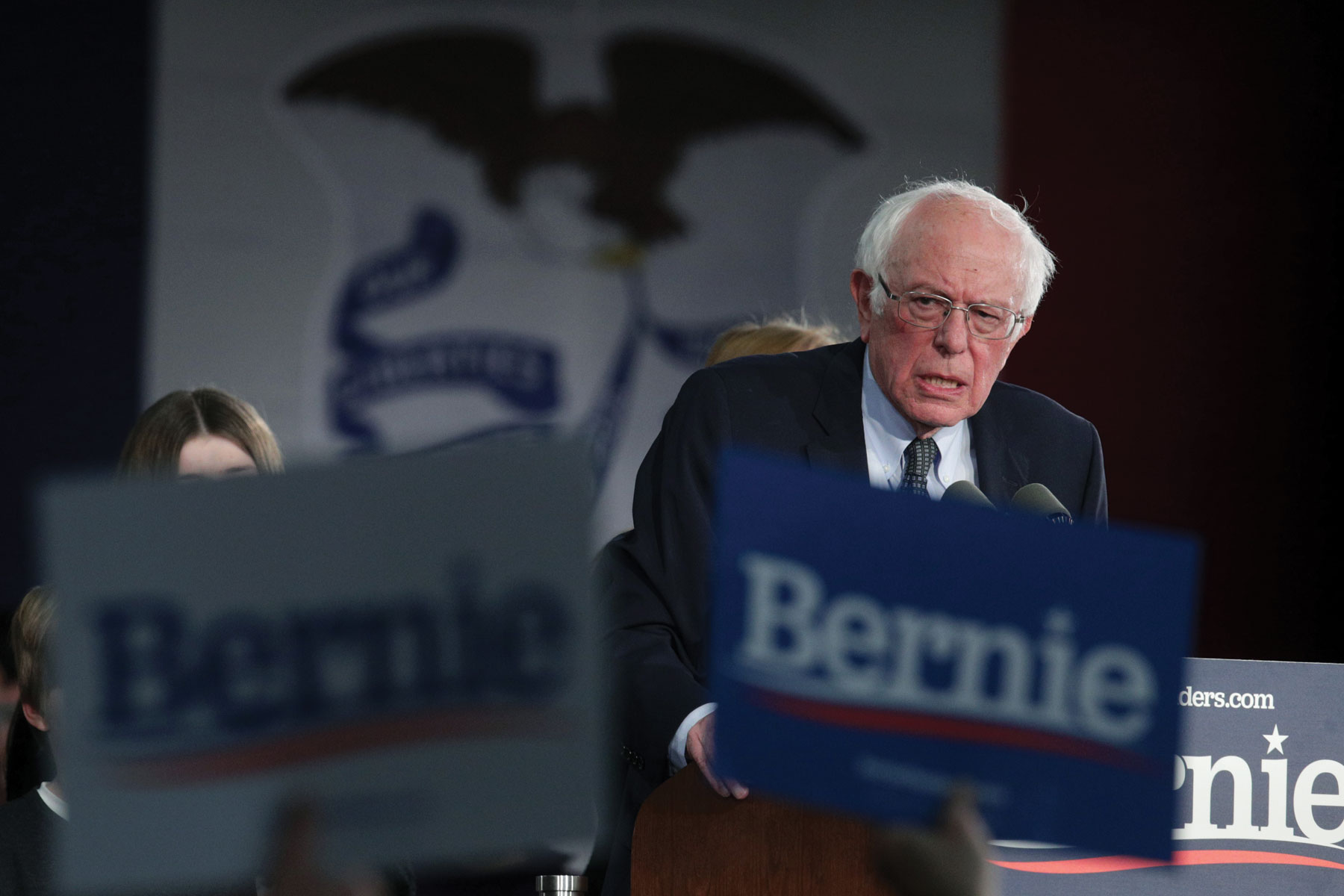 Photo by Alex Wong/Getty Images
Photo by Alex Wong/Getty Images What is the Jewish angle in all American elections? There are three: the Jewishness of a candidate, such as Donald Trump (Jewish daughter and grandchildren) or Bernie Sanders (Jewish); the Jewishness of the voters — that is, which candidate will win the support of Jewish voters. A lot is known about these two angles.
We’re familiar with the candidates, their ancestry and their religious or cultural identification. We take pride in them if they are elected. We worry about their success, lest it awakens old demons. Think Joe Lieberman, 2000 Democratic vice presidential nominee on the Al Gore ticket. Think John Kerry, the 2004 Democratic presidential candidate whose Jewish grandparents converted to Catholicism. Think Clinton’s son-in-law, Marc Mezvinsky.
Jews’ views also are familiar. How they vote is analyzed; they’re polled for their opinions. Seventy-six percent (according to a 2019 American Jewish Committee poll of 1,283 Jews older than 18 polled via telephone) have an unfavorable view Trump’s job performance; 62% “strongly disprove” of his handling of the threat of anti-Semitism in the U.S. Only 17% of Jews polled said that they voted for Trump in 2016 (fewer than the 24% who said right after Election Day that they voted for Trump).
The third angle is relatively difficult to assess: how each candidate might impact the state of the Jewish people. The United States is home to one of the world’s two main Jewish populations. It is also the superpower on which Israel, the other main Jewish community, relies for support. Therefore, there is a Jewish angle to all American presidential elections. My interest in the Iowa caucuses isn’t just because of my fascination with American politics. It’s also because of my parochial interest in Iowa’s influence on the fate of the Jewish people.
My interest in the Iowa caucuses … is because of my parochial interest in Iowa’s influence on the fate of the Jewish people.
Most Iowans are hardly aware of such influence. Most New Hampshirites (who vote next week) are hardly aware of such influence. But in caucusing for Sanders, who did well in Iowa and is leading the polls in New Hampshire, voters somewhat rattled the Jewish tribe. According to the Pew Reaserch Center, very few Jewish Democrats support Sanders (11%). Naturally, this could change over time, and will if he becomes the Democratic nominee. Still, it is clear that he is not the Jews’ preferred cup of tea. For many Israelis, a Sanders presidency seems like a nightmare. Sanders says he is “proud to be Jewish” but many Jews find it hard to feel the same pride as they look at him.
As an Israeli, I have no say in the American election and would never tell Americans to vote for this or that party or candidate. But I can still try to understand why Sanders, a surging Jewish candidate, raises concerns among Jews. When I do that, three answers emerge:
He is a radical, and most Jews instinctively know that an atmosphere in which radicalism thrives is an atmosphere in which Jews are in danger. It’s true that in many past cases, Jews were visible, even dominant, in radical circles. But American Jews, many of whom live comfortably and count themselves among American elites, have little reason to shake up things. In fact, I believe that many Jews in the U.S. instinctively objected to Trump for the same reason. He — like Sanders — is an engine of unrest. His visibility and influence on the political arena radicalizes it, and makes it more tolerant of extreme views.
He keeps the company of allies of whom Jews are justifiably suspicious. Recently, one of Sanders’ allies, Rep. Ilhan “It’s All About the Benjamins” Omar (D-Minn.), praised the candidate as someone who is “threatening to the status quo.” A fair number of American Jews dislike Omar for her comments and attitudes. A fair number of American Jews like the status quo. The status quo has been good for the Jews. Disrupting it is a risky bet.
Then, there is the fact Sanders is critical of Israel. Many Jews in America also are critical of Israel. But Sanders goes way beyond criticism. He threatens to shake the very foundation of the American-Israel alliance. “$3.8 billion is a lot of money, and we cannot give it carte blanche to the Israeli government,” the candidate said, in essence, questioning the U.S. commitment to hand Israel military aid. And he does that by using language that was rarely used by previous prospective presidential candidates. Democratic Majority for Israel President Mark Mellman called it “hyperbolic and vituperative language designed to stigmatize Israel.” True, some Jews who have large megaphones deplore some of Israel’s policies and no longer care (and would even cheer) if Israel is thrown under the bus. But I don’t think this is the view of the majority, and hence, that’s the third reason that many Jews feel uncomfortable with Sanders.
Shmuel Rosner is senior political editor. For more analysis of Israeli and international politics, visit Rosner’s Domain.























 More news and opinions than at a Shabbat dinner, right in your inbox.
More news and opinions than at a Shabbat dinner, right in your inbox.